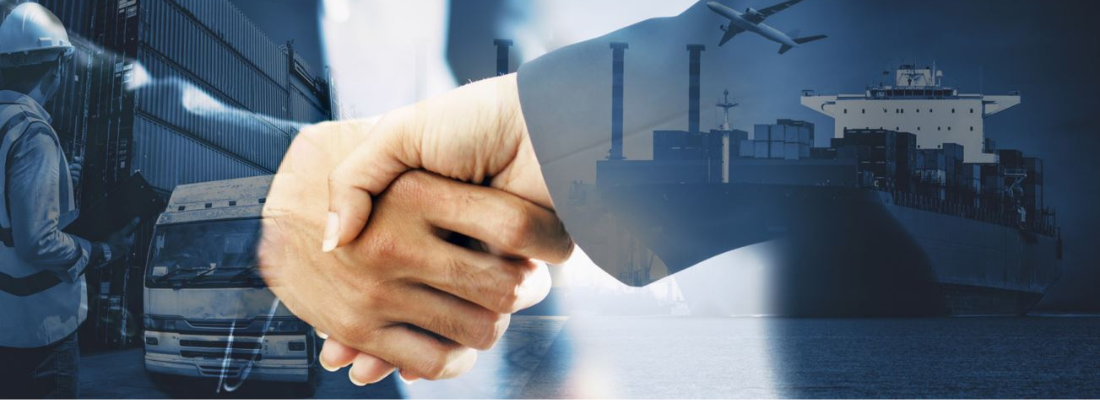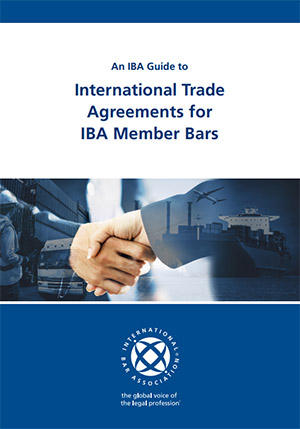Updated IBA Guide to International Trade Agreements reflects significant shift in the international landscape
Monday 24 July 2023

Download report

The International Bar Association (IBA) has published an updated edition of the IBA Guide to International Trade Agreements for IBA Member Bars (IBA GATS Handbook) to reflect the significant shift that has occurred in the international trade landscape in the intervening decade since the release of the 2013 edition. This updated guide aims to further legal professionals’ understanding of the General Agreement on Trade in Services (GATS) – a treaty of the World Trade Organization (WTO) that entered into force in 1995 – and of the consequences of other free trade agreements that have been signed on a bilateral or regional basis.
As with prior editions, the latest IBA GATS Handbook aims to provide practical assistance to Bars wishing to understand, and respond to, the international trade agreements signed by their respective governments of which there have been several developments, both within and outside of the WTO, that affect trade in legal services at both national and international levels.
The latest edition of the IBA GATS Handbook is based on research carried out by the IBA Bar Issues Commission’s International Trade in Legal Services Committee (IBA BIC ITILS) between November 2022 and January 2023. The co-authors are Alison Hook, Co-Founder of Hook Tangaza, a legal sector research and advisory consultancy and member of the IBA Section on Professional and Public Interest advisory board; Laurel Terry, Professor of Law Emerita, Penn State Dickinson Law, and Communications Officer of the IBA Anti-Money Laundering and Sanctions Expert Subcommittee; and Jonathan Goldsmith, international legal services consultant and member of the IBA BIC Policy Committee.
Co-Author Alison Hook remarked: ‘The latest trade agreements being negotiated are unrecognisable from the past. The most ambitious include extensive chapters on regulatory cooperation, joint policy initiatives and cooperation in international rule-making bodies. This, along with the fact that the digital revolution is changing how cross-border trade in legal services is being done, means that Bars need to be on top of what is going on in this area or risk being side-lined.’
Mickaël Laurans, Chair of the IBA BIC ITILS Committee, commented: ‘The IBA GATS Handbook has been the go-to resource for Bars and law societies having to consider the challenges of cross-border trade in legal services. Our three authors, Alison Hook, Laurel Terry and Jonathan Goldsmith, have done us an immense service in updating the guide to reflect the realities of today’s international trade.’
In 2022, the global value of the legal services sector was estimated to be close to US$1tn. If Bars are not aware of developments in trade agreements, they could miss out on helping their members access new opportunities, be ill-prepared to lobby governments on issues of fundamental importance to lawyers, and perhaps find their ability to regulate the legal profession undermined.
To some degree, all countries have legal services trade. With governments signing new free trade agreements with other countries regularly, currently there are more than 356 bilateral and regional trade agreements in force involving every region of the world.
Regional trading arrangements from the Africa Continental Free Trade Agreement through to the Regional Comprehensive Economic Partnership in Asia-Pacific affect every nation. Between 2021 to 2022 alone, there were 24 new notifications of agreements across the world. The newest generation of such agreements cover issues of particular interest to lawyers and Bars – from trade in legal services, international arbitration, and other forms of dispute resolution, through to international human rights and digital trade.
To assist lawyers and Bars in navigating the complexity of the current international trade terrain, the updated GATS Handbook is divided into four detailed parts:
- Part I provides a high-level policy context and overview of key trade in legal services concepts and practical tips on how Bars can engage with policymakers on trade in legal services issues.
- Part II sets out the international trade legal framework that governs trade in legal services for all WTO members.
- Part III provides key scenarios in which Bars may find themselves in relation to international trade in legal services negotiations, notably bilateral or regional trade agreements, and provides guidance on the notable differences in process that may characterise these different scenarios.
- Part IV summarises how the IBA has been assisting its Member Bars on trade in legal services matters and links to IBA resources.
The IBA GATS Handbook also has several recommendations for Bars, including that:
- Bars familiarise themselves with what is going on in relation to international trade in their jurisdiction and use the IBA GATS Handbook to understand how these changes might impact their members;
- Bars engage with governments and trade negotiators so that they know who to consult if any relevant issues arise in their negotiations; and
- Bars draw on the resources provided by the IBA to support them on cross-border legal services issues.
The guide is designed to be relevant for all IBA Bar members (and beyond), though it should have particular application for Bars in countries where government communication with the private sector is less developed than in highly active trading jurisdictions/blocs, such as Australia, the United Kingdom and United States, Association of Southeast Asian Nations (ASEAN), European Free Trade Association (EFTA), and the European Union (EU).
The first edition of the IBA GATS Handbook was published in 2003, then revised in 2013.
ENDS
